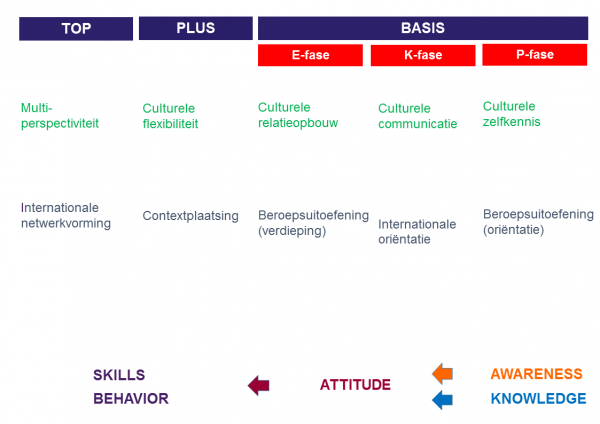This is an old revision of the document!
Table of Contents
Programme line Internationalisation
Developing Global Minds
Summary
This page broadly describes the Internationalisation programme line developed for Fontys ICT . This programme line stems from the general Internationalisation policy as described in the ambition plan 2013-2016. The programme line for internationalisation has three programmes (Basic, Plus and Top) and is implemented differently within the Fontys ICT study programme variants.
Basic program, Plus program and Top program
1. Introduction
This page broadly describes the Internationalisation programme line developed for Fontys ICT . This programme line stems from the general policy Internationalisation as described in the ambition plan 2013-2017. The programme line for internationalisation has three programmes (Basic, Plus and Top).
WHY
The study programmes of Fontys ICT are located in fields of expertise where knowledge is built up, shared and applied worldwide. Fontys ICT wants to train students who can move in a self-conscious, culturally sensitive and socially conscious way in an international labour market.
The aim of internationalisation is therefore to promote the quality of education, to better equip students and to increase their professional opportunities in a global world.
Internationalisation is a concretion of the Think Bigger idea and leads to enrichment of the curriculum, students with a global perspective and inspired employees.
In addition, internationalisation offers Fontys ICT the opportunity to build a wider reputation and to strengthen its reputation.
Every study programme at higher professional education (HBO) level in the Netherlands is expected to have internationalisation embedded in its curriculum; it is a standard on which we are assessed during a external visitation.
HOW
Talent Development is the guiding principle. Fontys ICT wants to create a learning environment for every student in which demonstrable international and intercultural competencies are developed during the study.
Figure 1 gives an overview of the competencies in the Basic, Plus and Top program.
Figure 1
Overview of competencies Basic, Plus and Top Programme Internationalisation Fontys ICT .
This makes internationalisation visible in the curriculum. For each semester, the Curriculumdatabase indicate how internationalisation is given a place in that specific unit of study.
WHAT
We offer 3 “routes” that students can follow:
- A Basic programme Internationalisation that applies to every student and that is part of our 'regular' curriculum. The student works on the basic intercultural and international competencies.
- A Plus programme Internationalisation . The student works on the in-depth intercultural and international competencies @home and/or short time abroad.
- A Top programme Internationalisation. The student works on the deepening intercultural and international competencies for a longer period of time abroad.
2. Further development of the programmes
2.1 Basic programme Internationalisation
All parts of this programme are mandatory for the student.
- In his profile, the student follows an English-language semester or a semester in which internationalisation is central. Each profile offers a semester of education with an international character.
- The student follows a workshop/module Intercultural Awareness in the post-propaedeutic phase. In this module, integration with the English-language Bachelor Fontys ICT or with foreign partner universities preferably takes place.
- The student participates in an international week@home preferably in cooperation with (a) foreign partner(s).
2.2 Plus programme Internationalisation
The base is anchored in the profiles. The Plus programme can also be implemented in the specialisations. The student chooses one or more components from the Plus programme:
- The student participates in an International Week at a partner college or university abroad.
- The student participates in a joint quarterly or semester project of Fontys ICT with a partner university, partly @home and partly abroad.
- During the internship@home the student adds an international/intercultural dimension to his internship assignment.
- During the minor@home, the student adds an international/intercultural dimension to the minor assignment. This can be a Dutch-speaking or an English-speaking minor. Each profile offers an English-speaking minor for this purpose.
- The student adds an international/intercultural dimension to his final project during the graduation internship@home.
2.3 Top programme Internationalisation
The base is anchored in the profiles. The Top programme can also be implemented in the specialisations. The student chooses one or more components from the Top programme:
- The student does a six-month internship abroad and works on his international intercultural competencies.
- The student follows a six-month minor with a partner abroad and works on his international/intercultural competencies there.
- The student will graduate from abroad for six months, where he will work on his international/intercultural competencies.
2.4 Points of attention
- The student who follows the route of a Plus programme or a Top programme does not receive any extra EC's. The student will receive a Certificate with his diploma stating which of these parts of the Plus programme or the Top programme he has completed.
- English language is a point of interest for students. The level required in the Basic, Plus and Top programmes must be determined. Level B2 is required for exchange and participation in the Top programme. An entrance test with additional education may need to be offered.

